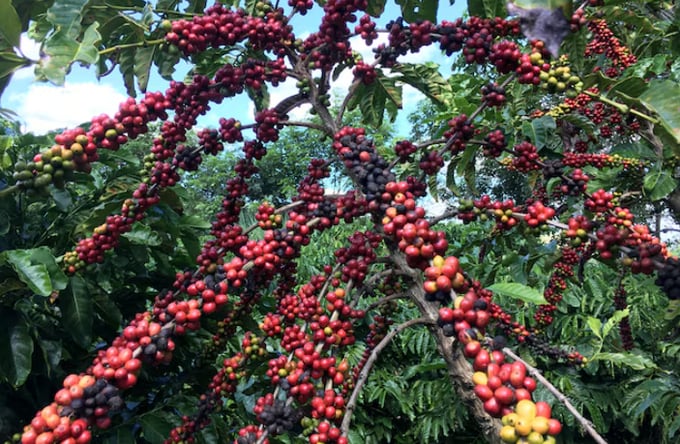November 19, 2025 | 14:13 GMT +7
November 19, 2025 | 14:13 GMT +7
Hotline: 0913.378.918
November 19, 2025 | 14:13 GMT +7
Hotline: 0913.378.918

The robusta coffee fruits are seen in Sao Gabriel da Palha, Espirito Santo state, Brazil May 2, 2018.
The Brazilian coffee industry is worried that sky-high coffee prices are leading some companies to expand offerings of what it calls fake coffee in the local market, as they seek to attract consumers who are feeling the pinch.
Brazil's coffee roasters association, ABIC, recently identified in groceries powdered products marketed as coffee, but that are mostly not made with the bean.
"It is a clear attempt to fool consumers," said Celirio Inacio da Silva, ABIC's executive director, adding that those powders could contain coffee waste such as peels or leaves, other vegetable pulp and artificial coffee flavoring.
Coffee prices in Brazil - the world's largest producer of the beans and the second-largest drinker of the beverage after the United States - have risen more than 50% in the last three months. Global prices hit all-time highs due to limited supplies following weather woes in producing countries.
ABIC said it has reached out to Brazilian health agencies and the Agriculture Ministry asking if such products are being sold legally.
One such product is called Oficial do Brasil, it said. Its package is similar to roast and ground brands sold locally, displaying a picture of a hot cup of coffee.
The description on the package reads, "traditional coffee flavor beverage." In smaller letters lower down, it says "artificial coffee flavor."
"We never said it was coffee," said Master Blends, the company that produces Oficial do Brasil, in a statement.
"We created a product to meet the demand of a class of consumers that is suffering from high prices," the company said, adding that the product is government-approved.
Anvisa, the Brazilian food and drug regulator, did not immediately respond to a request for comment regarding the product's approval status.
Such products currently sell in Brazil for around one-third of the price of regular coffee.
Reuters

(VAN) 'From the coffee story, we can think deeper and further about the crop production sector - from development orientations and value-chain organization to international integration,' assessed Dr Le Quoc Doanh.
/2025/11/18/2431-0-161627_248.jpg)
(VAN) Viet Nam accounts for 43% of the world's export volume of Robusta coffee. However, the Vietnamese Robusta coffee brand has yet to gain broad recognition on the global market.
/2025/11/18/5617-2-125215_406.jpg)
(VAN) The consumption demand for premium, healthy, and cold-brew tea products is rising globally, including in the Thai market, opening new opportunities for Viet Nam.

(VAN) The 3F+ model aims for selective resource management, regenerative protection, green education and consumption, all intrinsic to Dabaco’s sustainable development strategy.

(VAN) Carefully packed tea bags, neatly arranged inside containers, begin their 5,000-kilometer journey to Afghanistan, carrying with them the aroma of mountain forests and the pride of Lai Chau province.

(VAN) 'If we can address disease challenges and properly plan farming zones, Vietnamese shrimp can absolutely rise to lead the world,' Mr. Le Van Quang affirmed.

(VAN) The year 2025 continues to mark a significant footprint for Chanh Thu Fruit Import-Export Group Joint Stock Company (Chanh Thu Group) in the international market.